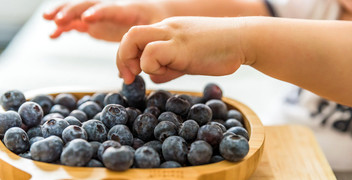Boost your immunity with these healthy foods
A strong immune system is key to good health. This article explores simple ways to support your immunity, including a balanced diet, regular exercise, and quality sleep. Small lifestyle changes can help protect your body and keep you feeling your best.

We all know that a strong immune system keeps us healthy. But can specific, healthy foods actually help boost our immune system and prevent us from falling sick?
According to Harvard Medical research. Yes.
When the immune system comes into contact with pathogens such as viruses, bacteria and foreign bodies, it actually triggers an immune response to release antibodies that attach to the pathogens to fight them off. Research has proven that specific foods actually contain essential vitamins and minerals that can strengthen a person’s immune response if eaten alongside a balanced diet.
So what healthy foods are we talking about? Here are our top 5 foods for boosting your immunity.
Blueberries
Often referred to as ‘Nature’s powerhouse’ Blueberries contain flavonoids which offer incredible antioxidant properties that play an essential role in protecting your immune system. In fact, a 2016 study showed that people who ate foods rich in flavonoids were far less likely to suffer from respiratory infections or the common cold if eating with a healthy diet.
Want to get more blueberries into your diet? Try adding them on top of your favourite healthy breakfast cereal, blending into your smoothies or eating them as a healthy snack so you get a burst of rich antioxidants first thing in the morning.
Turmeric
For years turmeric has been used to add flavour and colour to cooking, but did you know it also provides incredible anti-inflammatory, antioxidant and medicinal benefits? Yes, this vibrant spice actually contains the active ingredient Curcumin, a phyto-derivative which has been known to help speed up the healing process for upper respiratory infections, common colds and coughs.
The best way to add more turmeric into your diet is to simply sprinkle it directly into your healthy diet of soups, curries and stews. You can also make a traditional Ayurvedic healing tea called ‘Golden Milk’ a blend of ground turmeric, hot milk, honey and black pepper (to activate the Curcumin).
Sweet Potatoes
These hearty, root vegetables are not only delicious, but also highly nutritious as they are rich in beta carotene, a great source of vitamin A. They are also rich in antioxidants (especially the bright orange and purple ones) which help your body fight against free radicals which can be linked to chronic illnesses and inflammatory diseases.
What’s the best way to eat sweet potatoes? Any way you like really. These versatile vegetables are great blended in soups, cut into fries and roasted in the oven, made into a healthy snack like fritters or even baked into southern bread and sweet brownies.
Spinach
Spinach made our top 5 not only because it’s rich in vitamin C, but because it is jam-packed with antioxidants, beta carotene and vitamin E which help to boost our immune systems to fight off infections. It is also one of the easiest foods to add to your diet due to its year-round availability.
Try blending raw spinach in your healthy breakfast smoothie, sautéing some with your poached eggs, adding it to your dhal curry, or whipping up a healthy, hearty salad to get the most out of its immune-boosting benefits.
Garlic
The most common ‘at home’ remedy for a common cold or cough. Garlic is universally used for its incredible anti-bacterial, anti-fungal and anti-inflammatorily properties which are renowned for helping the immune system fight off germs. In fact, if you often get sick with a cold or flu, eating garlic can help reduce your symptoms and heal your body much faster if eaten with a balanced diet.
When it comes to garlic, a little can go a long way. As it has a strong, intense flavour you just need to add a little chopped garlic to your stir-fries, curries, salad dressings or soups to reap the incredible benefits of this magical, medicinal root.
- Harvard Medical research (https://www.health.harvard.edu/staying-healthy/how-to-boost-your-immune-system), last accessed in October 2022
- US National Library of Medicine (https://www.ncbi.nlm.nih.gov/pmc/articles/PMC4863266), last accessed in October 2022
This document is for general information purposes only. This is neither a medical advice nor is meant to be a substitute for you consulting with your doctor.







